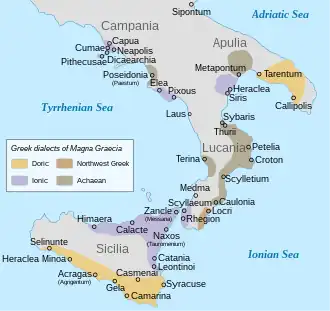| Abhisara |
|---|
Abisares (or Abhisara;[1] in Greek Ἀβισάρης), called Embisarus (Ἐμβίσαρος,) by Diodorus,[2] was a Kashmiri king of Abhira[3] descent whose territory lay in the river Hydaspes beyond the mountains. On his death in 325 BC, Alexander the Great appointed Abisares' son as his successor.[4][5][6][7]
Alexander the Great
Abisares sent embassies of submission to Alexander the Great and Alexander allowed him to retain his kingdom with considerable additions.[8][9]
Onesicritus said that Abisares had two huge snakes and Alexander had a great desire to see them.[10]
Kingdom
Aurel Stein equates the Hazara region, frequently identified as the ancient Urasa with Abhisara.[11][12] However, Stein identifies the kingdom of Abhisara with the tract of the lower and middle hills between the Vitasta (Jhelum) and Chadrabhaga (Chenab) including the state of Rajapuri (Rajauri) in Kasmira.[13][14][15] Old kingdom of Abhisara was basically situated in the Poonch, Rajauri and Nowshera districts of Jammu and Kashmir.[16][17][18]
See also
References
- ↑ Chisholm, Hugh (1910). "Alexander III (Alexander the Great)". Encyclopædia Britannica Eleventh Edition. Vol. 1.
- ↑ Diodorus, Bibliotheca, xvii. 90
- ↑ Enthoven, Reginald Edward (1990). The Tribes and Castes of Bombay. ISBN 9788120606302.
- ↑ Waldemar Heckel: Who’s who in the age of Alexander the Great. Prosopography of Alexander’s empire. Blackwell, Oxford 2006, ISBN 978-1-4051-1210-9 (excerpt online).
- ↑ Strabo Geogr., Geographica Book 15, chapter 1, section 28, line 11
- ↑ Διοδ. ΙΖ, 87
- ↑ Curt, VIII, 43, 13. XLVII, 1. IX, 1, 7, X, 3, 20
- ↑ Harry Thurston Peck, Harpers Dictionary of Classical Antiquities (1898), Abisares
- ↑ A Dictionary of Greek and Roman biography and mythology, Porus
- ↑ Aelian, Characteristics of Animals, 16.39
- ↑ Heckel, Waldemar; Tsouras, Peter G. (30 June 2021). Who's Who in the Age of Alexander and his Successors: From Chaironeia to Ipsos (338-301 BC). Greenhill Books. p. 2. ISBN 978-1-78438-651-1.
- ↑ (Mahabharata, Sabha-Parva,Ch.27;JASD.(1852)p. 234)
- ↑ Encyclopaedia of ancient Indian geography By Subodh Kapoor-page-3
- ↑ Kapoor, Subodh (2002). Encyclopaedia of Ancient Indian Geography. ISBN 9788177552980.
- ↑ Arrian, Anabasis Alexandri, v. 8, 20, 29; Curtius Rufus, Historiae Alexandri Magni, viii. 12-14, ix. 1, x. 1
- ↑ Political History of Ancient India: From the Accession of Parikshit to the Extinction of the Gupta Dynasty, 1953, p 248, Hemchandra Raychaudhuri, University of Calcutta
- ↑ The Mahābhārata, Its Genesis and Growth: A Statistical Study, 1986, p 115, M. R. Yardi, Bhandarkar Oriental Research Institute - Mahābhārata; Military History of India, 1980, p 38, Hemendra Chandra Kar - History
- ↑ Journal of Indian History, 1969, p 123, University of Kerala Dept. of History, University of Allahabad Dept. of Modern Indian History, University of Travancore, University of Kerala - India.
Other sources
- Smith, William (editor); Dictionary of Greek and Roman Biography and Mythology, "Abisares", Boston, (1867)
- Waldemar Heckel: Who's who in the age of Alexander the Great. Prosopography of Alexander's empire. Blackwell, Oxford 2006, ISBN 978-1-4051-1210-9 (excerpt online)
![]() This article incorporates text from a publication now in the public domain: Smith, William, ed. (1870). "Abisares". Dictionary of Greek and Roman Biography and Mythology.
This article incorporates text from a publication now in the public domain: Smith, William, ed. (1870). "Abisares". Dictionary of Greek and Roman Biography and Mythology.
